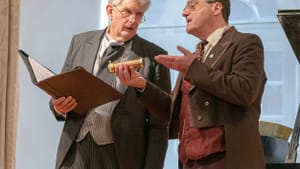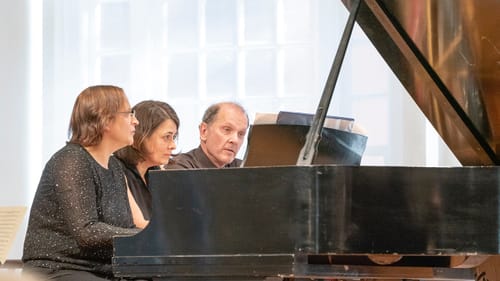Stay in the Loop
BSR publishes on a weekly schedule, with an email newsletter every Wednesday and Thursday morning. There’s no paywall, and subscribing is always free.
Brahms versus Wagner
Fine Art Music Company presents ‘War of the Romantics Part II’

The Fine Art Music Company (FAMC) did not disappoint in providing an engaging sequel to its successful January program dedicated to early 19th-century Romanticism—a subject much more fraught in its time than we realize today.
On Sunday, as the daffodils and early bluebells blossomed in Rittenhouse Square, the Philadelphia Ethical Society auditorium was once again standing room only for some extraordinary music-making in the finest, and most authentic, traditions of the later Romantic composers: Brahms, Wagner, and Liszt.
The choice of the intimate, salon-like Ethical Society (and Ivy Hall, on alternate nights) is a major part of the charm of these programs in a city dominated by big-box venues like the Kimmel and the Academy of Music. Here is chamber music as it was meant to be heard.
No bed of roses
But as the title suggests, this was no bed of roses. Two styles of musical Romanticism battled in a war of words waged by powerful critics in the press, carried into the streets by infuriated music lovers—in today’s terms, much more than a debate on a classical radio station’s Facebook page. Today, fans of Romanticism may not even realize there had been sides to take, but in the mid-19th century, whether you were a Brahmsian (conservative) or Wagnerite (progressive) made all the difference.
FAMC captured this fervor with intense musical performances stitched together in a lighthearted but enlightening play written and directed by Ella Remmings. Once again, Robert Edwin was extraordinarily effective as the progressive (fictional) critic Gerhard Denhoff, joined for this episode by Joe Barron as the notorious (and historically real) champion of traditional values, Eduard Hanslick. The two bicker, parry, and riposte throughout the program, educating with the lightest possible touch.
Artistry and chemistry
But what about the music?
While its innovative atmosphere, theatricality, and imaginative educational approach are laudable, it is through music-making that FAMC has won and secured a loyal, enthusiastic audience. The company has an ensemble of superb musicians led by cofounder and artistic director Rollin Wilber, who bring technical proficiency and deep emotional insight to the performance of every work. There was a signature feeling to both parts of this series, which at the same time expressed the individual artistry of the performers and their chemistry with each other.
The group took an unusual approach to Brahms’s darkly enveloping Piano Quintet in F minor. Instead of performing it from start to finish, the movements were played in order throughout the program, but interspersed with other selections.

Separation anxiety
The concert opened with the first movement, played with rhapsodic abandon by pianist Katarzyna Salwinski, violinists Min-Young Kim and Samuel Nebyu, violist Timothy Schwartz, and cellist Michal Schmidt. It is not only the violinist who reaches for the stars during this work; Schmidt’s cello soared with heartbreaking effectiveness while remaining a fully integrated part of the ensemble. Salwinski seemed to lead the group through the work’s labyrinthine passages, not only through a fearless percussive drive but also, and more importantly, as an interpretive guiding star. The three subsequent movements of the Brahms quintet were interspersed among Hungarian dances, Liszt’s Dante Sonata, and other works in the program.
At first, I experienced a kind of separation anxiety when the familiar notes of the first movement were followed by the fourth Hungarian dance, played with dazzling energy and a sense of fun by Nebyu on violin and Wilber on piano. But it soon became apparent that this is a new way of listening to any commanding multipart work: apportioning its movements throughout the program to encourage strategic focus.
I’m not saying this would enhance every composition (please don’t do this with the late Beethoven quartets!), but with thoughtful planning, such an approach has its place. There was, however, a bit of a slump in the second movement of the Brahms. Whether this was a disconnect caused by having to roll out an introspective slow movement after a breezy dance tune, I can’t say. However, the second movement picked up with the passage of time, and the final two movements of the Brahms, following on the heels of a transcendent Wagner’s Liebestod (played by Wilber), could not be equaled for ardor and synergy.
Profound and rollicking
As he did in Part I, Edwin once again soloed beautifully during the concert, showing his versatility as actor and baritone, this time in the ballad from Tieck’s Die Schöne Magelone. The program also featured Wilber in Liszt’s “After a Reading of Dante.” The character of Denhoff made much of the diabolical implications of this “Dante Sonata,” but in fact, the final whisperings of heavenly revelation and divine grace are the most sublime elements, played by Wilber, without a score, in a performance infused with reverence and profound feeling.
The concert ended with a rollicking rendition of Liszt’s Grand Galop Chromatique, with Salwinski, Wilber, and Schmidt (turning to the piano) all crowded together on the piano bench having a great time, arms flailing like some gigantic insect as they tackled this work for six hands. It’s hard to think how FAMC can follow this act next season.
What, When, Where
War of the Romantics, Part II: Battle! Mind over Music. Works by Johannes Brahms, Richard Wagner, and Franz Liszt; with a script by Ella Remmings. Katarzyna Salwinski, piano; Min-Young Kim and Samuel Nebyu, violin; Timothy Schwarz, viola; Michal Schmidt, cello and piano; and actors Robert Edwin and Joe Barron. Fine Art Music Company. March 30 and 31, 2019, at the Philadelphia Ethical Society, 1906 S. Rittenhouse Square, Philadelphia. (215) 803-9725 or www.fineartmusic.com.
Sign up for our newsletter
All of the week's new articles, all in one place. Sign up for the free weekly BSR newsletters, and don't miss a conversation.

 Linda Holt
Linda Holt